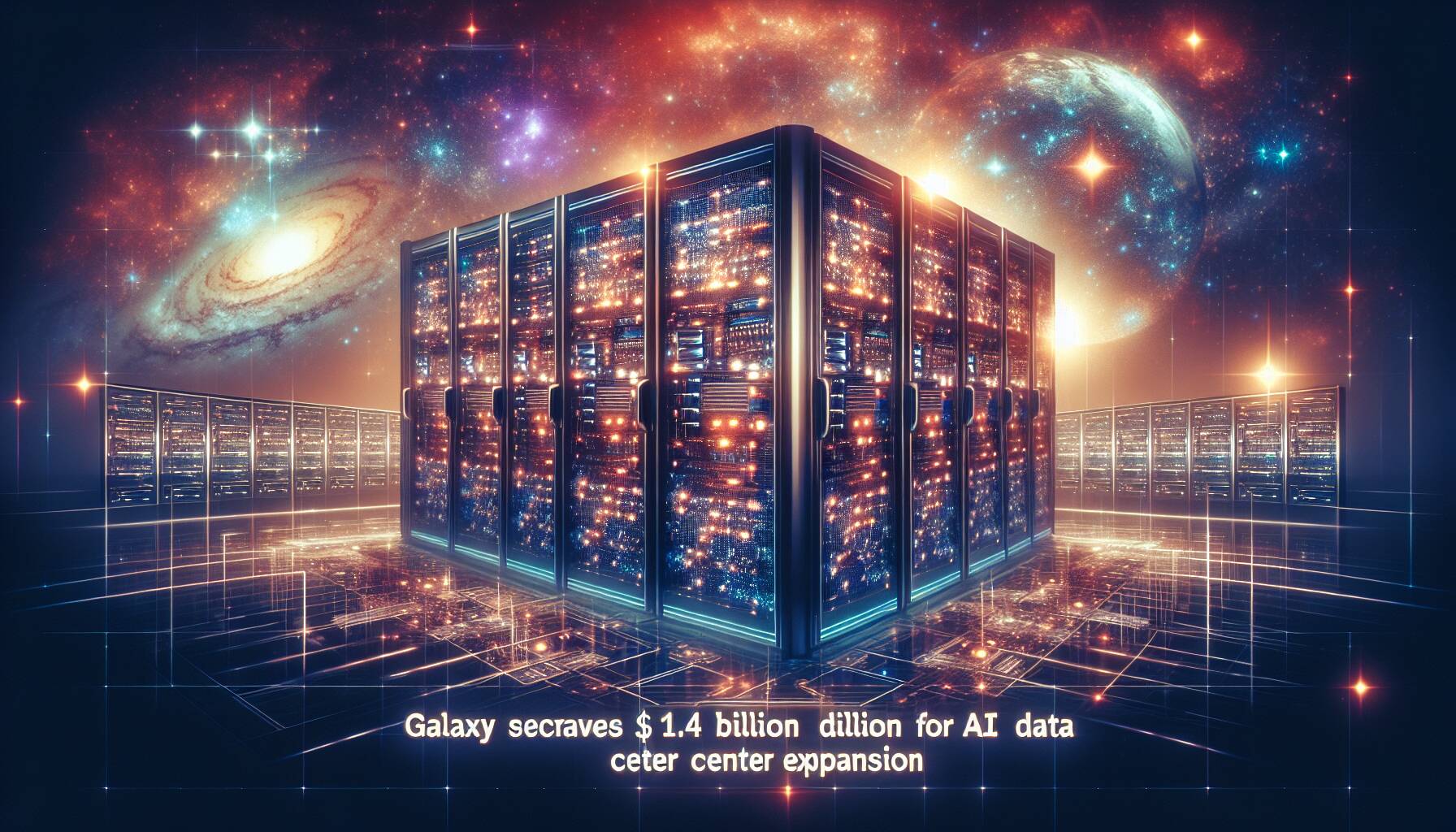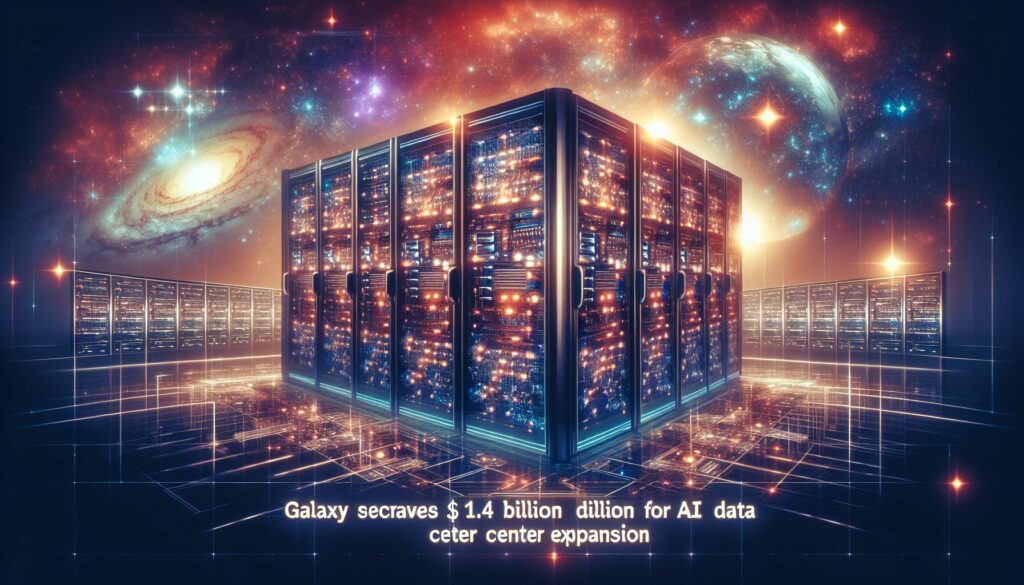Galaxy, the Nasdaq-listed digital asset investment firm, made headlines on Friday by announcing a significant funding milestone aimed at enhancing its Helios data center in West Texas. The firm has secured $1.4 billion to boost its computing capacity, catering to the growing demands of artificial intelligence (AI) and high-performance computing (HPC), which are becoming increasingly crucial in today’s tech landscape.
The funding encompasses a debt facility that will cover 80% of the construction costs and is set to last for 36 months. Alongside this, Galaxy has already invested $350 million in equity to kickstart the project. Despite this ambitious move, Galaxy’s shares experienced a slight decline of 2.2% during early trading, paralleling a broader market pullback.
“This strategic expansion is a response to the rising power needs of U.S. tech firms as AI competition intensifies,” said Galaxy CEO Mike Novogratz.
Central to this expansion is a deal with AI cloud provider CoreWeave, which will utilize all 800 megawatts of the approved power capacity at Helios. The first phase of this agreement will commence in early 2026, providing a long-term power solution for CoreWeave. Novogratz emphasized that this deal could potentially generate over $1 billion in average annual revenue over the next 15 years.
Traditionally recognized for its involvement in cryptocurrency trading and asset management, Galaxy is now expanding its focus to capitalize on the burgeoning data center market. This comes at a time when tech firms are racing to secure critical computing resources. Notably, TeraWulf has also made waves by soaring over 50% after signing a groundbreaking 10-year, $3.7 billion AI hosting contract with Fluidstack, and securing an 8% stake from Google.
According to recent analyses by Jefferies, a significant portion of Galaxy’s value—up to two-thirds—may soon be attributed to its data center ventures, marking a pivotal shift in the firm’s operational strategy.

Key Points on Galaxy’s $1.4 Billion Funding for AI Data Center Expansion
Galaxy’s recent funding and operational moves may have significant implications for the technology and investment sectors. Here are the key points:
- Funding Secured:
- Galaxy has secured $1.4 billion for expanding its Helios data center in West Texas.
- The debt facility covers 80% of construction costs and has a term of 36 months.
- Investment in AI and HPC:
- This funding aims to enhance computing capacity focused on artificial intelligence (AI) and high-performance computing (HPC).
- CoreWeave Partnership:
- Galaxy entered a lease agreement with AI cloud provider CoreWeave, which has committed to utilize 800 megawatts of power capacity.
- The first phase of power delivery to CoreWeave is expected to start in early 2026.
- Projected Revenue:
- The CoreWeave deal could generate over $1 billion in average annual revenue over the next 15 years.
- Market Influence:
- Shares of Galaxy fell 2.2% in early trading amid a broader market pullback.
- Industry Competition:
- U.S. tech firms are increasingly competing for power and compute resources as AI technology advances.
- Notable competitors like TeraWulf have already experienced significant stock increases due to similar moves.
- Valuation Insights:
- Reports suggest that two-thirds of Galaxy’s value may derive from its data center business.
Galaxy’s $1.4 Billion Funding: A Strategic Move in the AI Data Center Race
The recent announcement from Galaxy highlights a significant endeavor in the digital asset landscape, with its $1.4 billion funding aimed at expanding the Helios data center in West Texas. This strategic shift toward enhancing computing capabilities for AI and high-performance computing (HPC) aligns Galaxy with the increasing demand for robust data infrastructure. Unlike competitors like TeraWulf, which recently saw substantial share growth following its own major deal with Google, Galaxy’s approach may have both advantages and hurdles in this competitive market.
Competitive Advantages: Galaxy’s partnership with CoreWeave ensures a stable power supply as it leases the entire 800 megawatts of approved capacity. This long-term contract not only secures a significant client for Galaxy but also projects potential earnings exceeding $1 billion annually over the next 15 years. Furthermore, by covering 80% of the construction costs through a debt facility, Galaxy demonstrates a strong commitment to this expansion without over-leveraging its existing equity.
On the other hand, the news indicates a disadvantage—the initial market reaction saw a 2.2% drop in Galaxy’s shares, reflecting investor skepticism in the context of broader market pullbacks. While the firm’s pivot to data centers rides on a wave of rising AI competition, challenges lie in establishing its brand credibility outside its core crypto-focused identity. The notable rise of TeraWulf, stemming from its lucrative partnership with tech heavyweight Google, presents a contrasting trajectory that could overshadow Galaxy’s achievements during this critical expansion phase.
Potential Beneficiaries and Adverse Effects: The evolving scenario offers immense potential for tech firms dependent on AI and HPC services, who can leverage Galaxy’s enhanced capacity to grow their operations. However, competitors are likely to feel the pressure as well, particularly those who struggle to secure similar partnerships and infrastructures. The success of Galaxy’s Helios project could raise the stakes, pushing rivals to intensify their pursuit of resources and partnerships in an already competitive ecosystem. As Galaxy navigates this landscape, its ability to restore investor confidence and showcase value beyond crypto will be pivotal in determining its long-term viability amidst fierce competition.

















